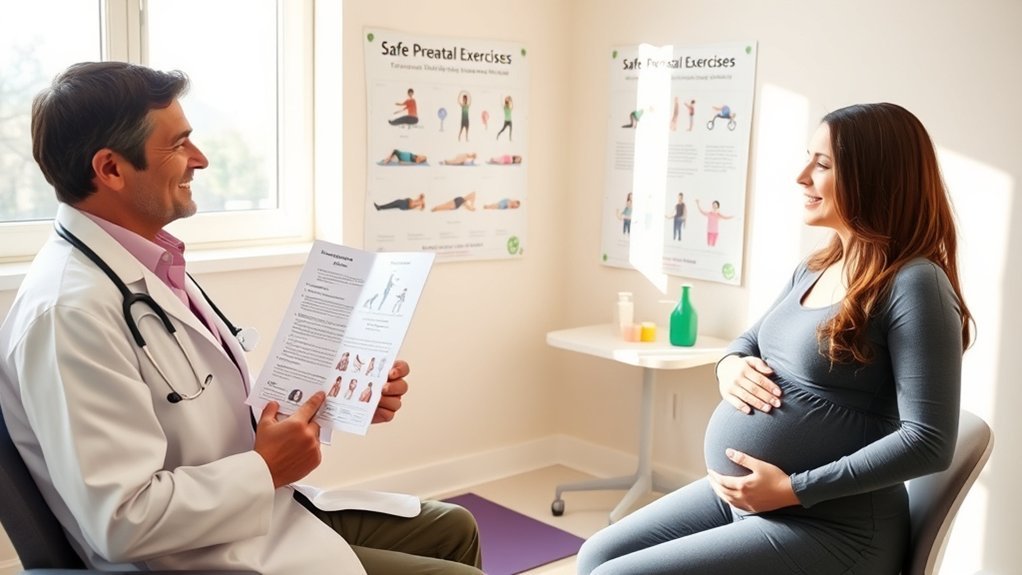Your first prenatal visit can set the tone for a healthy pregnancy—after all, what you do now can impact both you and your baby. It’s vital to discuss your medical history and any concerns you might have. Understanding nutrition, safe exercises, and stress management will play key roles in your journey. Let’s explore the essential aspects of this visit that will help you build a solid foundation for a healthy pregnancy.
Understanding Your Medical History

When you prepare for your prenatal visit, understanding your medical history is essential, as it helps your healthcare provider tailor the best care for you and your baby.
Begin by gathering relevant information about your past pregnancies, any complications, and your general health. Be ready to discuss chronic conditions, allergies, and medications you’re currently taking. This information not only informs your provider about potential risks but also guides decisions on screenings and tests.
Gather details about past pregnancies, health conditions, and medications to guide your prenatal care effectively.
If applicable, share your family history, particularly concerning genetic disorders or health issues. Remember, being open and accurate guarantees you receive the most appropriate care.
Your proactive approach will help create a personalized prenatal plan that supports your health and the well-being of your growing child.
Importance of Nutrition

Nutrition plays an essential role during pregnancy, as it directly impacts your health and your baby’s development.
You’ll need to focus on vital nutrients and healthy eating guidelines to guarantee you’re getting what you both need.
Essential Nutrients for Pregnancy
As you commence on the journey of pregnancy, understanding the essential nutrients your body needs is crucial for both your health and the development of your baby.
Key nutrients include folic acid, which helps prevent neural tube defects; iron, important for oxygen transport; and calcium, significant for bone development.
Omega-3 fatty acids support brain growth, while protein aids in tissue development. Additionally, vitamins D and B12 are crucial for immune function and energy metabolism, respectively.
Staying hydrated is equally significant, as it supports overall health.
By focusing on these nutrients, you’re not just nourishing yourself; you’re also laying a strong foundation for your baby’s future.
Prioritize a balanced intake to help guarantee a healthy pregnancy.
Healthy Eating Guidelines
How can you guarantee you’re making the best food choices during pregnancy? Start by focusing on a balanced diet rich in fruits, vegetables, whole grains, lean proteins, and healthy fats. These foods provide essential nutrients your body and baby need.
Aim for variety to make sure you’re getting all the vitamins and minerals necessary for fetal development. Stay hydrated by drinking plenty of water, and limit sugary beverages.
Pay attention to portion sizes, as they can help manage weight gain. Avoid processed foods high in sugar and unhealthy fats, which can negatively impact your health.
Finally, consider consulting a healthcare provider or a registered dietitian for personalized guidance. This proactive approach empowers you to nurture both your and your baby’s health effectively.
Safe Exercise Practices

While engaging in exercise during pregnancy can offer numerous benefits, it’s vital to prioritize safety for both you and your developing baby. Start by consulting your healthcare provider to tailor an exercise plan that suits your individual needs.
Focus on low-impact activities like walking, swimming, or prenatal yoga, which reduce injury risk and improve flexibility. Always listen to your body; if you feel pain, dizziness, or shortness of breath, stop immediately.
Maintain hydration and avoid overheating during workouts. It’s also essential to warm up and cool down to prevent muscle strain.
Finally, consider joining a prenatal exercise class, where you can receive guidance and support from professionals and connect with other expectant mothers.
Avoiding Harmful Substances
To guarantee a healthy pregnancy, it’s crucial to avoid harmful substances that can jeopardize both your well-being and your baby’s development.
Avoiding harmful substances is essential for ensuring a healthy pregnancy and supporting your baby’s development.
By making informed choices, you can create a safer environment for your growing child. Here are some key substances to steer clear of:
- Tobacco: Increases risks of low birth weight and preterm labor.
- Alcohol: Can lead to fetal alcohol spectrum disorders, affecting development.
- Illicit drugs: May cause serious complications and developmental issues.
- Certain medications: Always consult your doctor before taking any medication.
- Chemicals: Limit exposure to household cleaners, pesticides, and other chemicals.
Being mindful of these substances can greatly benefit both you and your baby throughout your pregnancy.
Managing Stress Effectively
Managing stress during pregnancy is essential for both you and your developing baby.
Incorporating mindfulness techniques can help you stay grounded, while regular physical activity offers significant benefits for your mental well-being.
Let’s explore how these strategies can support you through this transformative time.
Mindfulness Techniques
As your pregnancy progresses, stress management becomes increasingly essential for both your well-being and that of your baby. Incorporating mindfulness techniques can markedly help you manage stress effectively.
Here are some strategies to take into account:
- Deep Breathing: Practice inhaling deeply through your nose and exhaling through your mouth to promote relaxation.
- Meditation: Spend a few minutes daily focusing on your breath or a calming mantra to center your thoughts.
- Gratitude Journaling: Write down three things you’re grateful for each day to shift your perspective.
- Mindful Walking: Take short walks, paying attention to your surroundings and the sensations in your body.
- Body Scanning: Lie down and mentally scan your body, releasing tension in each area.
Implementing these techniques can foster a more peaceful pregnancy experience.
Physical Activity Benefits
While you navigate the challenges of pregnancy, incorporating regular physical activity can greatly enhance your mental well-being and reduce stress levels. Engaging in exercise releases endorphins, which are natural mood lifters, helping you to feel more relaxed and balanced. Activities like walking, swimming, or prenatal yoga can improve your physical health while also providing a sense of accomplishment and control.
Moreover, establishing a routine can create structure in your day, further alleviating anxiety. Listening to your body is essential; choose activities that feel comfortable and enjoyable.
Routine Screenings and Tests
Routine screenings and tests during your prenatal visits are essential for monitoring both your health and your baby’s development.
Routine screenings during prenatal visits are vital for tracking your health and your baby’s growth.
These assessments help identify any potential issues early on, ensuring you receive the appropriate care.
Here are some key tests you can expect:
- Blood tests to check for anemia, infections, and blood type.
- Urinalysis to screen for urinary tract infections and protein levels.
- Ultrasound to assess fetal growth and confirm due dates.
- Genetic screening for potential hereditary conditions.
- Glucose screening to test for gestational diabetes.
Building a Support System
Building a strong support system during your pregnancy is essential, as it can greatly impact your emotional well-being and overall health. Surround yourself with people who uplift you—friends, family, and even pregnancy support groups.
Communicate your needs clearly; letting others know how they can help is vital. Don’t hesitate to reach out to your healthcare provider for additional resources, including counseling services if needed.
Consider involving your partner in prenatal classes to strengthen your bond and share the experience. Remember, it’s okay to seek help; pregnancy can be overwhelming, and having a reliable network can make managing this journey easier.
Prioritizing your emotional health will benefit both you and your baby as you prepare for this new chapter in your life.
Frequently Asked Questions
What Should I Expect During My First Prenatal Visit?
During your first prenatal visit, you’ll discuss your health history, undergo a physical exam, and possibly get blood tests. You’ll also receive guidance on nutrition, exercise, and what to expect in your pregnancy journey.
How Can I Manage Morning Sickness Effectively?
To manage morning sickness effectively, try eating small, frequent meals, stay hydrated, and consider ginger or vitamin B6. Resting and avoiding strong odors can also help alleviate symptoms, making your experience more comfortable.
Are There Specific Vitamins I Should Take?
You should definitely take prenatal vitamins, including folic acid and iron. While you might feel overwhelmed, these nutrients support your baby’s development and your well-being. It’s a small step with a big impact.
When Should I Schedule My Next Prenatal Appointment?
You should schedule your next prenatal appointment every four weeks during the first 28 weeks. After that, appointments can be more frequent, depending on your health and any specific concerns your healthcare provider may have.
What Are the Signs of Complications I Should Watch For?
You should watch for signs like severe abdominal pain, heavy bleeding, persistent headaches, visual changes, or decreased fetal movement. If you notice these symptoms, don’t hesitate to contact your healthcare provider immediately for guidance.
Conclusion
In conclusion, prioritizing prevention during your first prenatal visit paves the path for a prosperous pregnancy. By discussing your medical history, nourishing your body, and nurturing your emotional well-being, you’re setting a solid foundation for your baby’s bright beginning. Staying savvy about screenings and surrounding yourself with a supportive squad can greatly enhance your experience. Remember, a proactive approach today leads to a healthier tomorrow for both you and your little one. Embrace this exciting journey with confidence!
